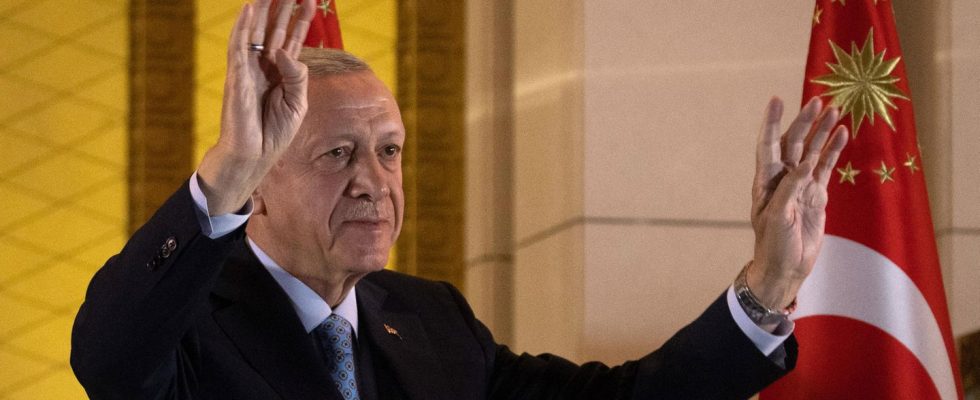The opposition narrowly missed the change of power in Turkey’s elections. Recep Tayyip Erdogan remains president after 20 years. But it won’t be an easy time ahead of him.
Turkish President Recep Tayyip Erdogan celebrates. He is standing in front of his palace in the capital Ankara, thousands of people are cheering him on with Turkish flags. “Our democracy has won,” he says. None of the 85 million Turks have lost, he is initially forgiving – and a little later he once again accuses the opposition of having connections to terrorists.
Erdogan won the runoff against his challenger Kemal Kilicdaroglu, cementing his power once again after 20 years at the top of Turkey. According to preliminary results, he received around 52 percent of the votes, Kilicdaroglu around 48 percent. Contrary to all predictions, he was already ahead in the first round two weeks ago, but missed the necessary absolute majority.
Currency crisis, poor crisis management after the earthquake disaster in February and tough action against government opponents, none of this could harm Erdogan in the end.
Will Erdogan become even more authoritarian now?
The opposition, which formed a six-party alliance, complained that the election campaign was unfair. She had hoped to be able to democratize the country again after an election victory. Her followers are devastated. Kilicdaroglu believes that despite Erdogan’s victory, the election shows that the people want “a change in an authoritarian government”.
Observers fear that Erdogan will govern in an even more authoritarian manner in the future after he has once again legitimized his power. Europe and the USA must now continue to prepare themselves for negotiations with a difficult NATO partner. Erdogan will probably retain his mediating role in the Ukraine war.
Erdogan also owes his electoral success to the support of an Islamist-nationalist alliance. This could continue to shape his politics in the future. “Erdogan has changed the character of the state. He has managed to transform the Turkish state from a secular-nationalist to an Islamist-nationalist one. And he will continue to do so,” says Asli Hürcan Aksoy from the Center for Turkish Studies (CATS).
Symbolic of this is that Erdogan wanted to celebrate his electoral success with a morning prayer in Hagia Sophia. In 2020, despite international protests, he had the former church converted from a museum into a mosque – a gift to his religious clientele.
economy as the greatest challenge
Also symbolic and a triumph for Erdogan: His victory falls exactly on the 10th anniversary of the government-critical Gezi protests. In the spring of 2013, young people in particular rebelled against Erdogan’s increasingly repressive policies across the country. Erdogan, then Prime Minister, had the protests put down.
The defeat is all the more bitter for the opposition. She looks at Erdogan’s partner with horror. With the Islamist-Kurdish Hüda Par and the Islamist Yeniden Refah, Erdogan has brought two parties into parliament that pursue LGBT and misogynistic policies. The Hüda Par, for example, wants to protect the “traditional” family from “deviant” ideologies, teach girls and boys separately and offer women working conditions that correspond to their “nature”.
The biggest challenge for Erdogan after the election will be the economy. According to experts, the massive inflation of around 44 percent is also home-made because Erdogan is sticking to his low interest rate policy, contrary to conventional economic logic.
Erdogan has nevertheless managed to convince his supporters that he is not to blame for the economic situation. Economics professor Selva Demiralp wrote in an article that if Erdogan does not return to conventional economic policy, it will be very difficult to repair the damage that has already been done. Turkey expected “very critical days”.
Erdogan called the opposition terrorists
The unequal starting conditions in elections are also part of Erdogan’s success story. According to international election observers, the election campaign was unfair from the start. The majority of the media is controlled by Erdogan, there was hardly any opposition and when it did, it was mostly negative.
Erdogan also generously distributed election gifts paid for from the state coffers. And he showed manipulated videos. He called the opposition terrorists, and his interior minister, in turn, put pressure on independent election observers. During the vote, several of them were attacked.
The six-party alliance around Kilicdaroglu, on the other hand, failed to convey to a majority that the opposition leader was the better alternative to Erdogan. In the first round, she relied on a positive election campaign and conciliatory rhetoric. The turnaround followed before the second lap. In a seemingly desperate attempt to win over ultranationalist voters, Kilicdaroglu fueled anti-refugee rhetoric. He entered into a pact with a right-wing politician.
The 180-degree turnaround did not go down well in their own ranks either, and especially not with Kurdish voters. Although the pro-Kurdish HDP once again called for support for Kilicdaroglu, turnout in the Kurdish south-east was below that of the first round.
The minority should probably not count on an easing of reprisals or even on efforts to find a solution to the Kurdish conflict. Erdogan does not forgive anyone who opposes him, as history teaches. The parliament, in which Erdogan’s alliance holds a majority, is also the most nationalist in Turkey’s history.
At least the approximately 3.4 million Syrians in the country should breathe a sigh of relief after Erdogan’s victory. Although Erdogan, like the opposition, has announced that he will send refugees back to northern Syria, observers do not expect major resettlements. Erdogan knows exactly that medium-sized Turkish entrepreneurs in the southeastern Turkish towns of Gaziantep and Sanliurfa need Syrian refugees as workers, says expert Aksoy. “These companies are the backbone of his clientele-based system.”
The six-man alliance of Kilicdaroglu is now in ruins. The 74-year-old, who has been at the head of the largest opposition party CHP for 13 years, will probably not be able to avoid resigning this time.

